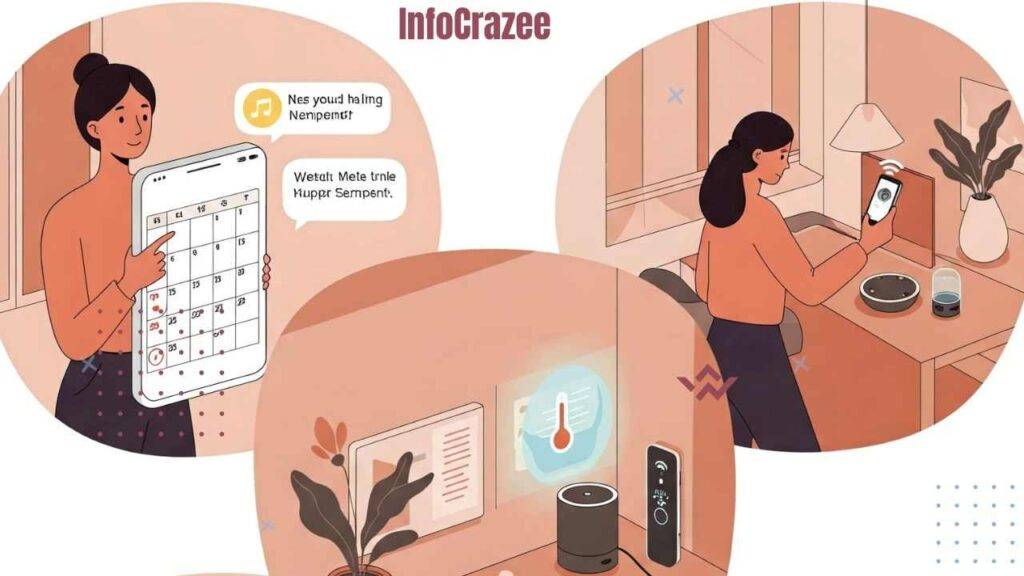AI Virtual Assistants: How They are Changing the Way We Get Things Done
We’ve all heard about AI virtual assistants—those digital helpers that live in our phones, smart speakers, and laptops. But what are they really doing for us, and how are they changing the way we handle everyday tasks?
What Exactly Is an AI Virtual Assistant?
At its core, an AI virtual assistant is software designed to understand your voice or text commands and perform tasks for you. Think Siri, Alexa, Google Assistant, or even ChatGPT.
These assistants aren’t just fancy voice recorders—they’re powered by artificial intelligence that helps them understand your words, learn your preferences, and improve over time.
Making Everyday Life a Little Easier
AI assistants are becoming part of our routines without us even noticing. Here are a few ways they’re already helping:

1. Organizing Your Day
Tired of forgetting meetings or juggling appointments?
- Virtual assistants can schedule your calendar, send you reminders, and even book appointments with a simple voice command.
- You can ask, “What’s on my schedule today?” and get a rundown of your day in seconds.
Real-life example:
Mike, a busy dad and small business owner, uses his Google Assistant every morning to check his to-do list and remind him when it’s time to pick up the kids.
2. Helping at Home
Smart homes are getting smarter thanks to AI assistants.
- Control your lights, thermostat, or coffee machine with your voice.
- Play music, set timers, or even ask for recipes while you cook.
Real-life example:
Sarah tells Alexa to “turn off the lights” when she’s already in bed. No more stumbling around in the dark.
3. Smarter Communication
AI assistants can send texts, read messages, and even answer calls.
- You’re cooking with messy hands? Just say, “Text Emma: I’ll be there in 10.”
- Driving? Use voice commands to call someone hands-free.
They keep you connected without you having to lift a finger.
Boosting Productivity at Work
Whether you’re working from home or in an office, AI assistants are great at helping you stay focused and get more done.

1. Virtual Note-Taking
During meetings, some assistants can now:
- Transcribe conversations in real-time.
- Highlight key points or action items.
- Send summaries to your inbox.
This means you can stay engaged in meetings instead of scribbling notes.
2. Quick Research and Info Lookup
Need a stat or definition fast? Just ask.
- Instead of switching tabs or scrolling through results, your assistant gives you a straight answer.
- Great for multitaskers or when you’re on a deadline.
3. Task Management Help
From managing to-do lists to tracking progress on projects, AI can take over the admin stuff.
- Apps like Notion AI or ChatGPT can help organize ideas, write drafts, or plan your week.
- This saves time and boosts focus on creative or strategic work.
Learning and Getting Smarter Over Time
AI assistants aren’t stuck in time. They learn from your behavior.
- If you always call your mom Sunday night, your assistant might suggest it.
- Ask for your favorite playlist once, and next time, it’ll know which one you mean.
The more you use them, the more helpful they become.
Privacy and Limitations to Keep in Mind
It’s not all magic and convenience—there are things to consider.
- Privacy concerns: Your assistant is always listening for its “wake word,” which raises questions about data collection.
- Language understanding: Sometimes, they misunderstand or struggle with accents or slang.
- Dependence: It’s easy to become too reliant, especially for basic memory tasks or decisions.
The key? Use AI as a tool—not a crutch.
A Quick Look Into the Future
The future of AI virtual assistants looks exciting:
- More personalization: They’ll adapt even more to your habits and preferences.
- Better conversation skills: Less robotic, more natural chats.
- Workplace integration: Think of an assistant that can manage emails, schedule meetings, and even write reports.
You’ll be spending less time juggling tasks and more time doing what matters.
Final Thoughts
AI virtual assistants aren’t just cool gadgets—they’re becoming real tools to simplify and supercharge our lives. Whether it’s staying organized, managing work, or making daily routines smoother, they’re proving to be surprisingly helpful.
As they keep getting smarter, they’ll become even more of a helping hand—one that fits in your pocket, sits on your desk, or responds from your kitchen counter.
FAQs
1. Are AI virtual assistants always listening to me?
They’re always listening for their wake word (like “Hey Siri” or “Alexa”), but they don’t record conversations unless activated. Still, it’s smart to review your privacy settings regularly.
2. Can AI assistants understand different languages and accents?
Most can handle multiple languages and are improving at recognizing different accents. However, they may still have trouble with strong dialects or background noise.
3. Do I need a smart home to use an AI assistant?
Nope! You can use virtual assistants on your phone, tablet, or computer—even without smart devices. But adding smart tech at home unlocks more helpful features.






